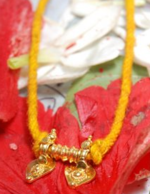| Revision as of 16:44, 29 June 2019 editGnanvit (talk | contribs)Extended confirmed users786 editsmNo edit summaryTag: Visual edit← Previous edit | Revision as of 05:00, 17 September 2019 edit undoKlbrain (talk | contribs)Autopatrolled, Extended confirmed users, New page reviewers87,615 edits Closing, given that there is no consensus, discussion is stale and both pages seem to be referenced so the case is unclear; see Talk:Pushpaka#Proposed merge with Pushpaka BrahminNext edit → | ||
| Line 1: | Line 1: | ||
| {{merge|Pushpaka|discuss=Talk:Pushpaka#Proposed merge with Pushpaka Brahmin|date=February 2018}} | |||
| ] | ] | ||
| '''Pushpaka Brahmin''' is a generic term that refer to a group of various ] ] castes of ] in the ] community.<ref>{{cite book|url=https://books.google.com/books?id=JmjaAAAAMAAJ&q=puspakar |title=Polity, Society, and Women: With Special Reference to Travancore, 1700-1900 A.D. |first=Suma |last=Rose |publisher=Carmel International Publishing House |year=2004 |page=217 |isbn=9788187655374 |accessdate=2013-04-30}}</ref> Pushpaka Brahmin include primarily two castes - ] (or Pushpaka Unnis) and ], who were assigned the job of tending flowers and making garlands in the Hindu temples and were given rights to teach sacred texts and Sanskrit language in the Pathasalas associated with Hindu temples. Later some other communities like Theeyatt Unnis, Kurukkals, and Puppallis. having similar culture and temple-related jobs were also considered to be Pushpaka Brahmins.<ref>{{cite book |title=Report of the Commission for Reservation of Seats in Educational Institutions, Kerala, 1965 |date=1965 |publisher=Commission for Reservation of Seats in Educational Institutions |location=Kerala}}</ref> | '''Pushpaka Brahmin''' is a generic term that refer to a group of various ] ] castes of ] in the ] community.<ref>{{cite book|url=https://books.google.com/books?id=JmjaAAAAMAAJ&q=puspakar |title=Polity, Society, and Women: With Special Reference to Travancore, 1700-1900 A.D. |first=Suma |last=Rose |publisher=Carmel International Publishing House |year=2004 |page=217 |isbn=9788187655374 |accessdate=2013-04-30}}</ref> Pushpaka Brahmin include primarily two castes - ] (or Pushpaka Unnis) and ], who were assigned the job of tending flowers and making garlands in the Hindu temples and were given rights to teach sacred texts and Sanskrit language in the Pathasalas associated with Hindu temples. Later some other communities like Theeyatt Unnis, Kurukkals, and Puppallis. having similar culture and temple-related jobs were also considered to be Pushpaka Brahmins.<ref>{{cite book |title=Report of the Commission for Reservation of Seats in Educational Institutions, Kerala, 1965 |date=1965 |publisher=Commission for Reservation of Seats in Educational Institutions |location=Kerala}}</ref> | ||
Revision as of 05:00, 17 September 2019

Pushpaka Brahmin is a generic term that refer to a group of various Hindu Brahmin castes of Kerala in the Ambalavasi community. Pushpaka Brahmin include primarily two castes - Pushpakas (or Pushpaka Unnis) and Nambeesans, who were assigned the job of tending flowers and making garlands in the Hindu temples and were given rights to teach sacred texts and Sanskrit language in the Pathasalas associated with Hindu temples. Later some other communities like Theeyatt Unnis, Kurukkals, and Puppallis. having similar culture and temple-related jobs were also considered to be Pushpaka Brahmins.
Community welfare
Nowadays, Pushpaka Brahmins are reluctant to cling to their traditional professions like priesthood, adhyapanam (teaching) in Pathasalas, malakettu (garland making), vilakkeduppu (lamp bearing). Due to low income from these professions. Sree Pushpakabrahmana Seva Sangham is an organisation working for the welfare of Pushpaka Brahmin castes.
References
- Rose, Suma (2004). Polity, Society, and Women: With Special Reference to Travancore, 1700-1900 A.D. Carmel International Publishing House. p. 217. ISBN 9788187655374. Retrieved 2013-04-30.
- Report of the Commission for Reservation of Seats in Educational Institutions, Kerala, 1965. Kerala: Commission for Reservation of Seats in Educational Institutions. 1965.
- "62 Priests to Travancore Devaswam Board" (in Malayalam). Malayala Manorama. Quote:തിരുവിതാംകൂർ ദേവസ്വം ബോർഡ് ക്ഷേത്രങ്ങളിലേക്ക് 62 ശാന്തിക്കാർ കൂടി - നായർ, വാരിയർ, മാരാർ, പുഷ്പകർ എന്നീ വിഭാഗങ്ങളിൽനിന്ന് ആരുമില്ല.